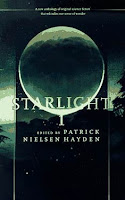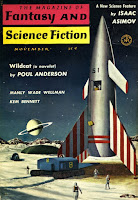This novella has a complicated publication history. It originally appeared as a limited edition chapbook in 1986. An abridged version appeared in August 1987 in Asimov's. The story was later revised and expanded from the original edition for publication in Tor Double #13. The collections the novella was published in afterwards contain the third version. Ironically, the magazine version, which Robinson thinks is the least of the three, won the Nebula in 1987.
A blind mathematician is asked to study some geometric drawings by a colleague who regularly takes on jobs at the Pentagon. The drawings mean little to him but the colleague arouses his suspicion. The woman who has made the drawings intrigues him however. He decided to continue with the investigation and is soon drawn into a game of lies and suspicion from which it proves nearly impossible to extricate himself.
As with many of Robinson's stories, the main character of
The Blind Geometer is a scientist. It shows in the way he thinks. Much of his thoughts are given over to geometry, a theorem by Desargues in particular. This is apparently the bit that the Asimov edition trimmed. A decision I can understand at some level but also makes the story less... Robinson I suppose. His writing is just not the same if he can't elaborate on some bit of science. Math, I will admit, has never been my strong suit but that doesn't stop me from following this story.
The most striking feature of this story is how Robinson deals with the character's blindness though. The story is written from a first person perspective so Robinson can't describe what the main character sees. He relies much more on auditory and sensory input to convey what the character experiences. Robinson uses lots of music in his tale for instance. Including a reference to Keith Jarret's
The Köln Concert which I happened to have listened to last week. He likens voices to instruments in an orchestra, is acutely aware of timbre and tension, and of course the mathematics behind acoustics. It enables him to detect a lie from the way words are spoken. There is an explanation of how not being able to see can be an advantage in higher dimension geometry. Try to picture a shape in four or more dimensions and you'll soon tie your brain in knots.
There is one particular scene in the book where this way of processing information from the senses is portrayed in a very dramatic fashion. I have no idea if this is anywhere close to how a person blind from birth would experience the world, but it certainly works to convey his mood at that point in the story. He seems very aware of the difference between a person with vision and himself. I couldn't entirely escape the impression that the writer trying to wrap his head around how a blind person would approach a certain situation seeps through here and there.
If you enjoy Robinson's novels, you will most likely like this novella. It contains many of the elements that crop up in his novels. I quite liked this particular story but I do think his writing works better in the long form. While I liked
The Blind Geometer for the science and how the character goes about his business, I was less impressed with the spy element of the story. It feels a bit under developed. The motivation to involve him is made clear, but who exactly wanted information from him is not. I suppose that is not really what the story is about, but it could have used a bit more attention. It is still well worth the read though, I would even say it is not a bad introduction to Robinson's writing either. If his work piques your curiosity this would be a good place to start.
Story Details
Title: The Blind Geometer
Author: Kim Stanley Robinson
Language: English
Originally published: The Blind Geometer (1986)
Read in: The Best of Kim Stanley Robinson (2010)
Story length: Novella
Awards: Nebula Award winner, Hugo Award nominated
Available online: Not that I am aware of.

























